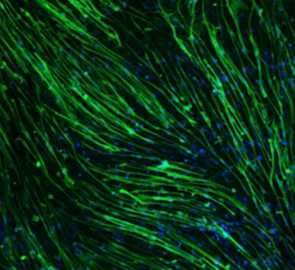
rPeptide是美国一家生物化学研发公司,主要产品涉及领域为老年性痴呆症与帕金森综合症研究使用的重组蛋白,重组多肽,抗体以及试剂等等,另外还提供一系列外包服务,从分子生物学,蛋白表达与蛋白纯化到13C与15N 统一标记蛋白与多肽。同时, rPeptide 技术平台可解决可溶性多肽/蛋白(例如:β-淀粉样蛋白、廋蛋白、前胰岛素)在大肠杆菌中表达等历史性难题。
以下是该公司部分代表产品:
Antibodies(抗体)
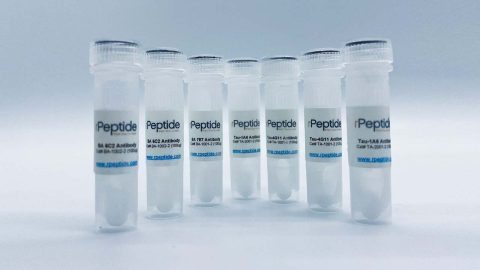
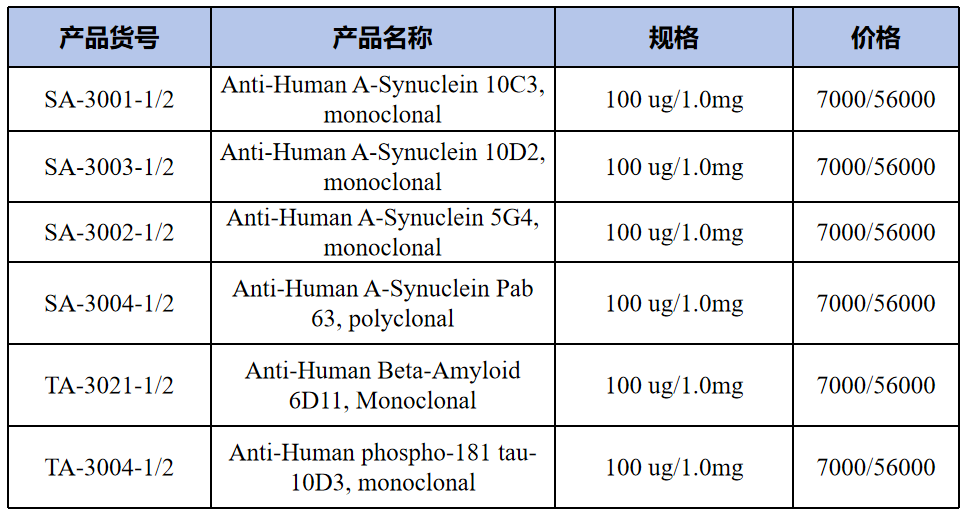
Peptides(多肽类)
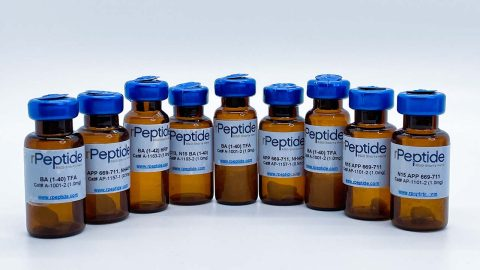

Proteins(蛋白质)
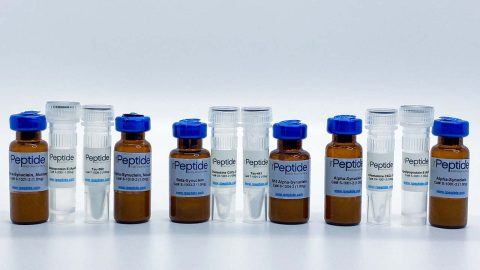
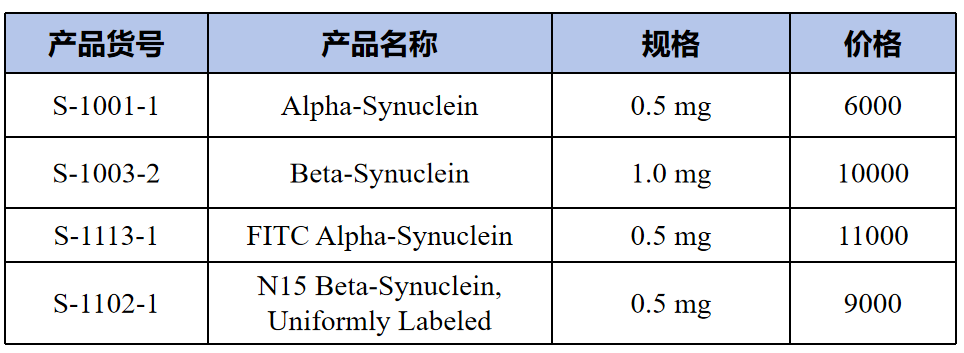
Neurodegenerative related compounds(神经退行性相关化合物)
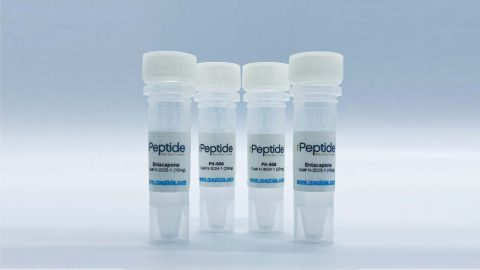
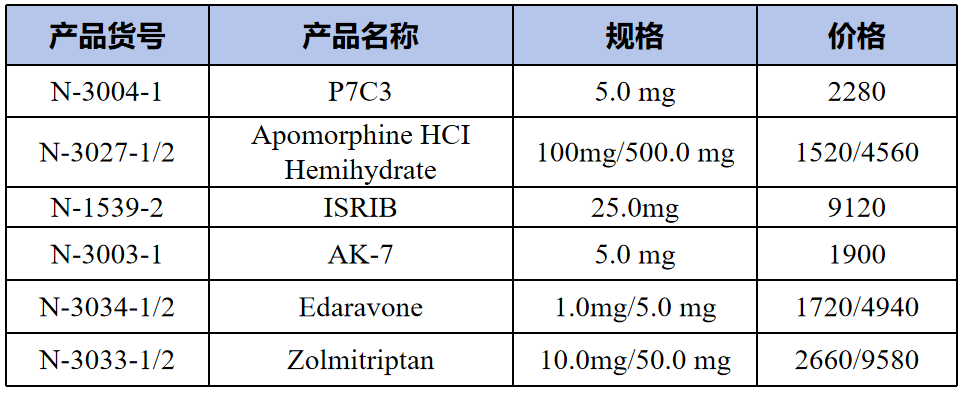
Coronavirus research tools(冠状病毒研究工具)
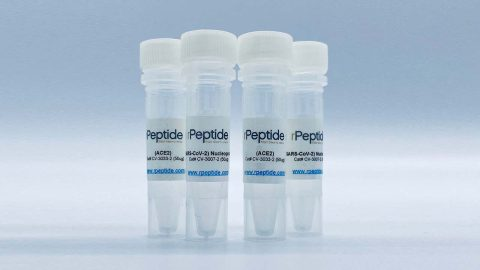
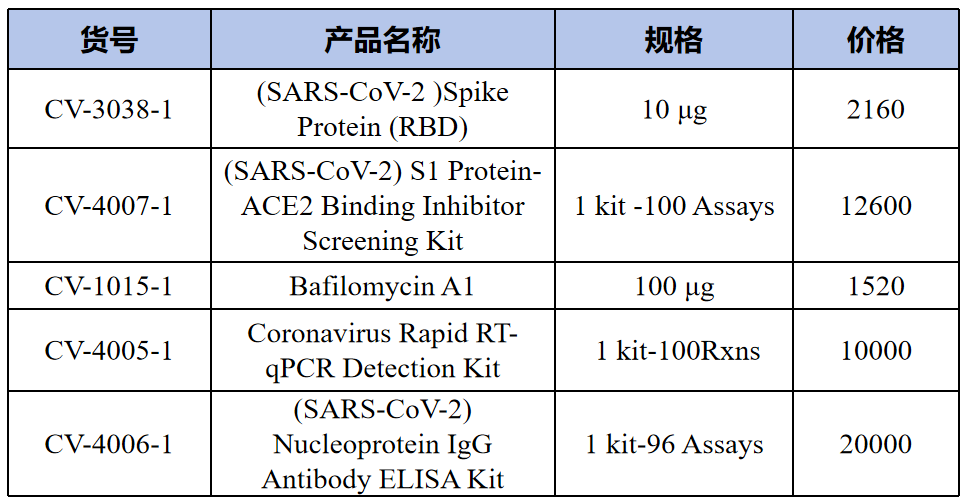
Kits(试剂盒)
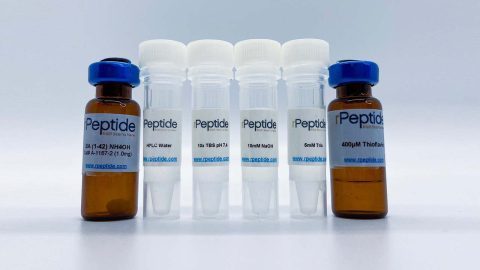
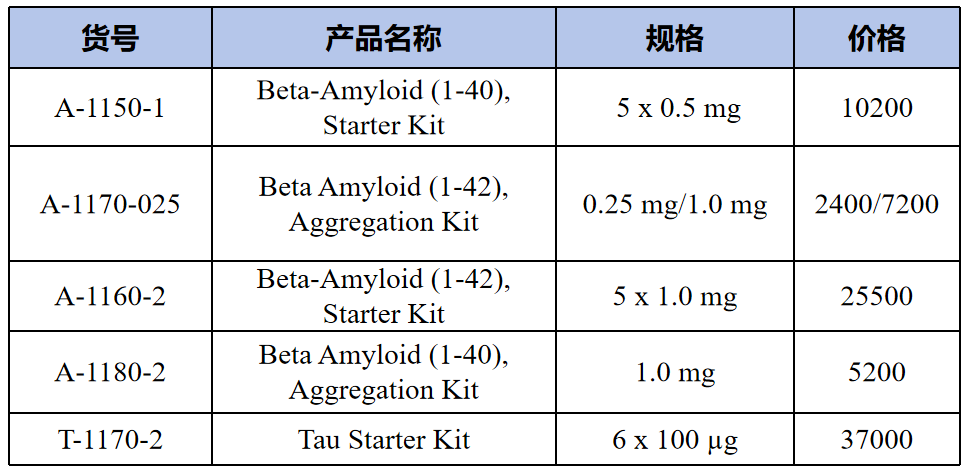
Preformed fibrils(预成型的纤维)
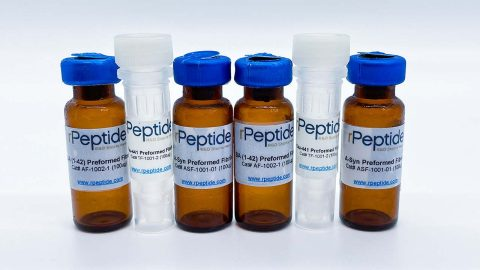

rPeptide 产品列表
Coronavirus Research Tools
| 货号 | 名称 | 规格 | 描述 |
| CV-3027-1 | Proteinase K, (20 mg/ml Solution), Standard Grade | 5 ml | A serine protease that displays the ability to digest native proteins, thereby inactivating enzymes such as DNase and RNase without recourse to a denaturation process. It retains its activity in presence of SDS and urea. It is inactivated by diisopropyl fluorophosphates (DFP) and phenyl methane sulfonyl fluoride (PMSF). It is not inhibited by iodoacetic acid, the trypsin-specific inhibitor TLCK, the chymotrypsin-specific inhibitor TPCK, and p-chloromercuribenzoate. |
| CV-3027-2 | Proteinase K, (20 mg/ml Solution), Standard Grade | 25 ml | |
| CV-3027-3 | Proteinase K, (20 mg/ml Solution), Standard Grade | 100 ml | |
| CV-3029-1 | Proteinase K, Molecular Grade | 100.0 mg | A serine protease that displays the ability to digest native proteins, thereby inactivating enzymes such as DNase and RNase without recourse to a denaturation process. It retains its activity in presence of SDS and urea. It is inactivated by diisopropyl fluorophosphates (DFP) and phenyl methane sulfonyl fluoride (PMSF). |
| CV-3029-2 | Proteinase K, Molecular Grade | 500.0 mg | |
| CV-3029-3 | Proteinase K, Molecular Grade | 1 g | |
| CV-3029-4 | Proteinase K, Molecular Grade | 10 g | |
| CV-3030-1 | Proteinase K, Recombinant, NGS Grade | 100.0 mg | Proteinase K is a broad-spectrum serine protease. Our NGS grade recombinant Proteinase K is extensively purified to give highly active formulation free of any detectable nuclease activities. It is fully active up to 56°C and under denaturing conditions (e.g. in the presence of urea and/or SDS), what makes it ideal for digesting proteins in variety of applications. |
| CV-3030-2 | Proteinase K, Recombinant, NGS Grade | 500.0 mg | |
| CV-3030-3 | Proteinase K, Recombinant, NGS Grade | 1 g | |
| CV-3030-4 | Proteinase K, Recombinant, NGS Grade | 10 g | |
| CV-3031-1 | Proteinase K, Standard Grade | 100.0 mg | A serine protease that displays the ability to digest native proteins, thereby inactivating enzymes such as DNase and RNase without recourse to a denaturation process. It retains its activity in presence of SDS and urea. It is inactivated by diisopropyl fluorophosphates (DFP) and phenyl methane sulfonyl fluoride (PMSF). It is not inhibited by iodoacetic acid, the trypsin-specific inhibitor TLCK, the chymotrypsin-specific inhibitor TPCK, and pchloromercuribenzoate |
| CV-3031-2 | Proteinase K, Standard Grade | 500.0 mg | |
| CV-3031-3 | Proteinase K, Standard Grade | 1 g | |
| CV-3031-4 | Proteinase K, Standard Grade | 10 g | |
| CV-1047-1 | Rapamycin | 10.0mg | Potent immunosuppressant. The rapamycin-FKBP12 complex binds to and inhibits mTOR.Inhibits IL-2-induced activation of p70 S6 kinase. Extends lifespan of mice. Induces autophagy in a variety of cell lines. |
| CV-1047-2 | Rapamycin | 50.0mg | |
| CV-3024-1 | Recombinant SARS-CoV-2 Nucleoprotein (1-430; His-tag)* | 10 μg | Severe acute respiratory syndrome (SARS) is a viral respiratory illness caused by a coronavirus called SARS-associated coronavirus (SARS-CoV). SARS coronavirus belongs to a family of enveloped coronaviruses. Coronaviruses are enveloped, single-stranded, positive-sense RNA viruses that belong to the subfamily Coronavirinae. The coronavirus genome encodes a spike protein (S), an envelope protein, a membrane protein, and a nucleoprotein in this order. Nucleoprotein packages the positive strand viral genome RNA into a helical ribonucleocapsid (RNP) and plays a fundamental role during virion assembly through its interactions with the viral genome and membrane protein M. It also plays an important role in enhancing the efficiency of subgenomic viral RNA transcription as well as viral replication |
| CV-3024-2 | Recombinant SARS-CoV-2 Nucleoprotein (1-430; His-tag)* | 50 μg | |
| CV-3022-1 | Recombinant SARS-CoV-2 Nucleoprotein (1-430)* | 10 μg | Severe acute respiratory syndrome (SARS) is a viral respiratory illness caused by a coronavirus called SARS-associated coronavirus (SARS-CoV). SARS coronavirus belongs to a family of enveloped coronaviruses. Coronaviruses are enveloped, single-stranded, positive-sense RNA viruses that belong to the subfamily Coronavirinae. The coronavirus genome encodes a spike protein (S), an envelope protein, a membrane protein, and a nucleoprotein in this order. Nucleoprotein packages the positive strand viral genome RNA into a helical ribonucleocapsid (RNP) and plays a fundamental role during virion assembly through its interactions with the viral genome and membrane protein M. It also plays an important role in enhancing the efficiency of subgenomic viral RNA transcription as well as viral replication. |
| CV-3022-2 | Recombinant SARS-CoV-2 Nucleoprotein (1-430)* | 50 μg | |
| CV-1102-1 | Remdesivir | 500 μg | Remdesivir is a nucleoside analogue with antiviral activity. It inhibits Middle East respiratory syndrome coronavirus (MERS-CoV) or severe acute respiratory syndrome coronavirus (SARS-CoV) infected HAE cultures with EC₅₀ values of 74 nM and 69 nM. It inhibits murine hepatitis virus (MHV) with an EC₅₀ of 30 nM in delayed brain tumor (DBT) cells. |
| CV-1102-2 | Remdesivir | 1.0 mg | |
| CV-1046-1 | Ribavirin | 100 mg | Clinically useful antiviral guanosine nucleoside analog, active against RSV, hepatitis C and other RNA and DNA viruses. Binds to and redistributes eIF4E from the nucleus to the cytoplasm3 and inhibits eIF4E-dependent Akt survival signaling. Displays efficacy against atypical teratoid/rhabdoid tumors and inhibits glioma cell growth. A molecular docking study suggests effectiveness against SARS-CoV-2 RNA-dependent RNA polymerase. |
| CV-1046-2 | Ribavirin | 250 mg | |
| CV-1043-1 | RIPA-56 | 10.0 mg | RIPA-56 is a potent (IC50=13 nM, EC50=28 nM for HT-29 cells) and selective inhibitor of Receptor-Interacting Protein 1 (RIP1) kinase with significant metabolic stability (t1/2=128 min human liver microsomal stability assay). RIPA-56 showed excellent kinase selectivity and did not inhibit IDO at 200 µM. It was able to block the progression of multiple sclerosis in an immune-induced demyelination model. |
| CV-1043-2 | RIPA-56 | 50.0 mg | |
| CV-1032-1 | Ruxolitinib | 5.0 mg | Potent and selective JAK1&2 inhibitor, IC50s=2.7, 4.5 and 322 nM for JAK1, JAK2 and JAK3 respectively. Blocks IL-6 signaling (IC50=281 nM) and proliferation of JAK2V617F+ Ba/F3 cells (IC50=127 nM). Inhibits the proinflammatory secretome of senescent cells. The JAK1 S646P mutant is highly sensitive to ruxolitinib. Clinically useful anticancer agent. |
| CV-1032-2 | Ruxolitinib | 25.0 mg | |
| CV-1010-1 | RVX-208 | 5.0mg | RVX-208 is a potent BET bromodomain antagonist with IC50 of 0.510 μM for BD2, with approximately 170-fold selectivity over BD1. Increases apolipoprotein A-1 and HDL cholesterol in vitro and in vivo Reduces atherosclerosis. |
| CV-1010-2 | RVX-208 | 25.0mg | |
| CV-1038-1 | S1RA (E-52862) | 5.0 mg | S1RA (E-52862) is a potent and selective σ1 antagonist with weak binding at σ2 (IC50 σ1=17 nM, σ2=9300 nM) S1RA abolished mechanical and thermal hyperalgesia in mice with carrageenan-induced acute inflammation by enhancing the action of endogenous opioid peptides of immune origin in a σ1-dependent manner. S1RA potentiated µ-opioid antinociception in mice in a σ-dependent manner. Also displays neuroprotective effects in a mouse model of ischemic stroke. |
| CV-1038-2 | S1RA (E-52862) | 25.0 mg | |
| CV-1042-1 | SA4503 | 5.0 mg | SA4503 is a potent and selective sigma 1 agonist (σ1 IC50=17.4 nM, σ2 IC50=1784 nM). It has been investigated as a cognition enhancer, antidepressant, anti-addiction agent, and neuroprotectant. |
| CV-1042-2 | SA4503 | 25.0 mg | |
| CV-1028-1 | Santacruzamate A | 5.0 mg | A highly potent and selective inhibitor of HDAC2 isolated from the Panamanian marine cyanobacterium cf. Symploca (IC50=0.119 and 434 nM for HDAC2 and HDAC6 respectively). Induces apoptosis and cancer cell death only in combination with other HDAC1 inhibitors. Potential therapeutic agent for breast cancer. Attenuates Aβ fragment (Aβ25-35)-induced toxicity in PC12 cells by enhancing ER stress tolerance. Ameliorates Alzheimer’s disease-like pathology in mouse models. |
| CV-1028-2 | Santacruzamate A | 25.0 mg | |
| CV-3023-1 | SARS-CoV-2 Nucleoprotein (1-430, His-tag) | 10 μg | Severe acute respiratory syndrome (SARS) is a viral respiratory illness caused by a coronavirus called SARS-associated coronavirus (SARS-CoV). SARS coronavirus belongs to a family of enveloped coronaviruses. Coronaviruses are enveloped, single-stranded, positive-sense RNA viruses that belong to the subfamily Coronavirinae. The coronavirus genome encodes a spike protein (S), an envelope protein, a membrane protein, and a nucleoprotein in this order. Nucleoprotein packages the positive strand viral genome RNA into a helical ribonucleocapsid (RNP) and plays a fundamental role during virion assembly through its interactions with the viral genome and membrane protein M. It also plays an important role in enhancing the efficiency of subgenomic viral RNA transcription as well as viral replication. |
| CV-3023-2 | SARS-CoV-2 Nucleoprotein (1-430, His-tag) | 50 μg | |
| CV-3021-2 | SARS-CoV-2 Nucleoprotein (1-430) | 50 μg | Severe acute respiratory syndrome (SARS) is a viral respiratory illness caused by a coronavirus called SARS-associated coronavirus (SARS-CoV). SARS coronavirus belongs to a family of enveloped coronaviruses. Coronaviruses are enveloped, single-stranded, positive-sense RNA viruses that belong to the subfamily Coronavirinae. The coronavirus genome encodes a spike protein (S), an envelope protein, a membrane protein, and a nucleoprotein in this order. Nucleoprotein packages the positive strand viral genome RNA into a helical ribonucleocapsid (RNP) and plays a fundamental role during virion assembly through its interactions with the viral genome and membrane protein M. It also plays an important role in enhancing the efficiency of subgenomic viral RNA transcription as well as viral replication. |
| CV-3025-1 | SARS-CoV-2 Spike Protein S1 (Fc tag) | 10 μg | SARS-CoV is an enveloped, single and positive-stranded RNA virus. Cell entry of severe acute respiratory syndrome coronavirus (SARSCoV) is mediated by the viral spike (S) protein. The spike (S) glycoprotein of coronaviruses is known to be essential in the binding of the virus to the host cell at the advent of the infection process. The spike protein is a large type I transmembrane protein containing two subunits, S1 and S2. For viral entry, the surface unit (S1) of SARS S binds to the cellular receptor angiotensinconverting enzyme 2 (ACE2) and the transmembrane unit (S2) then fuses the viral membrane with a host cell membrane. The S protein plays key parts in the induction of neutralizing-antibody and T-cell responses, as well as protective immunity, during infection with SARS-CoV. Because the S protein of SARS-CoV is involved in receptor recognition, as well as virus attachment and entry, it represents one of the most important targets for the development of SARS vaccines and therapeutics. |
| CV-3025-2 | SARS-CoV-2 Spike Protein S1 (Fc tag) | 50 μg | |
| CV-3026-1 | SARS-CoV-2 Spike Protein S1 (His-tag) | 10 μg | |
| CV-3026-2 | SARS-CoV-2 Spike Protein S1 (His-tag) | 50 μg | |
| CV-1103-1 | T-705 (Favipiravir) | 5.0 mg | T-705 (Favipiravir) is an antiviral drug that selectively inhibits the RNA-dependent RNA polymerase of influenza virus. It is phosphoribosylated by cellular enzymes to its active form, favipiravir-ribofuranosyl-5′-triphosphate (RTP). Favipiravir is active against a broad range of influenza viruses, including A(H1N1)pdm09, A(H5N1) and the recently emerged A(H7N9) avian virus. It also inhibits influenza strains resistant to current antiviral drugs, and shows a synergistic effect in combination with oseltamivir, thereby expanding influenza treatment options. Recently, T-705 has been shown to give 100% protection against aerosol Ebola virus E718 infection in immune-deficient mice as well as inhibiting Ebola virus infection in cell culture. |
| CV-1103-2 | T-705 (Favipiravir) | 25.0 mg | |
| CV-1034-1 | Tigecycline | 10.0 mg | Clinically useful antibiotic1. Binds to the 30S ribosomal subunit of bacteria blocking the interaction of aminoacyl-tRNA with the ribosome. Active against Gram-positive and -negative bacteria, anaerobic and drug resistant bacteria such as MRSA, MRSE, and VRE. Has been shown to be selectively toxic to human acute myeloid leukemia cells over normal cells via inhibition of mitochondrial protein translation. Effective against other cancers including non-small cell lung cancer, melanoma and lymphoma and others. |
| CV-1034-2 | Tigecycline | 50.0 mg | |
| CV-1026-1 | Triptolide | 1.0 mg | Possesses potent immunosuppressive and anti-inflammatory activity. Irreversibly inhibits eukaryotic transcription via covalent binding to XPB, a subunit of the transcription factor TFIIH1. Blocks transactivation of NFkB. Exhibits potent antiproliferative activity in 60 cancer cell lines (average IC50 = 12 nM) and synergizes with other anticancer agents. Inhibits the inflammatory response and remarkably decreases production of TNF-a, IL-1β and IL-6 in a rat model of rheumatoid arthritis. |
| CV-1026-2 | Triptolide | 5.0 mg | |
| CV-1017-1 | Valinomycin | 10.0mg | Selective K+ ionophore. Induces the release of cytochrome c from mitochondria without inducing permeability transition. Induces mitochondrial swelling at concentrations as low as 1 nM. Induce K+ flow across natural and synthetic lipid vesicles. |
| CV-1017-2 | Valinomycin | 50.0mg | |
| CV-1005-1 | Verapamil | 1 g | L-type calcium channel blocker. Clinically useful for the treatment of hypertension and coronary artery disease. Binds to and inhibits P-glycoprotein and reverses multidrug resistance in multidrug-resistant CHO cells. Induces autophagy. |
| CV-1005-2 | Verapamil | 5 g | |
| CV-1045-1 | Volasertib | 5.0 mg | Volasertib is an extremely potent and selective inhibitor of Polo-like kinase, a critical controller of multiple essential steps of mitosis (IC50: Plk1=0.87 nM, Plk2=5 nM, Plk3=56 nM). It has shown efficacy in multiple solid xenograft tumors models1 and in clinical studies in patients with acute myeloid leukemia. Volasertib has also been shown to potently inhibit BRD4 (Kd=79 nM3, IC50’s bromodomains 1 and 2 of BRD4=300 and 770 nM respectively). |
| CV-1045-2 | Volasertib | 25.0 mg |
联系我们
相关推荐
评论列表共有 0 条评论
暂无评论
发表评论
取消回复
药科美专注生命科学产品进出口与技术服务





